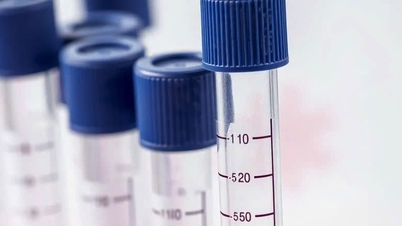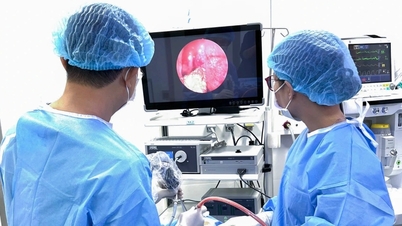The cause of daytime cough is often due to infection, allergy, air pollution or respiratory irritants. Meanwhile, nighttime cough is much more complicated, according to the health website Medical News Today (UK).

Coughing at night can be caused by a runny nose from allergies or an infection.
Coughing at night can disrupt your sleep. Therefore, to treat it effectively, the first thing to do is to determine the cause of the cough. These causes often include:
Runny nose
Runny noses are often caused by allergies or infections. When you lie down, mucus can run down and collect in the back of your throat, causing irritation and coughing. Simple solutions like elevating your head with pillows, using a humidifier, and taking antihistamines or decongestants can help relieve coughs.
Reflux
Gastroesophageal reflux disease (GERD) is another cause of nighttime coughs. However, many people do not know they have this condition. Coughing often occurs when lying down, especially on the back. This is because in this position, stomach acid can easily flow back up into the esophagus. A small amount of acid will enter the windpipe, causing irritation and coughing.
If you suspect that your nighttime cough is caused by acid reflux, see your doctor. Lifestyle changes, dietary changes, and medications can help control the condition and reduce your cough.
Asthma
Asthma can occur at any time of the day. However, many cases occur mainly at night, often accompanied by symptoms such as severe coughing, wheezing and difficulty breathing while sleeping.
This is because at night, lung function tends to decrease and makes asthma symptoms such as coughing worse. Not only that, the supine sleeping position also negatively affects the airflow into the lungs, hindering the ability to breathe and causing coughing.
Side effects of the drug
Side effects of certain medications such as angiotensin-converting enzyme (ACE) inhibitors, nonsteroidal anti-inflammatory drugs (NSAIDs), and beta-blockers can cause nighttime coughing. If you suspect your cough is a side effect of a medication, you should talk to your doctor immediately, according to Medical News Today .
Source link



![[Photo] The road connecting Dong Nai with Ho Chi Minh City is still unfinished after 5 years of construction.](https://vphoto.vietnam.vn/thumb/1200x675/vietnam/resource/IMAGE/2025/11/04/1762241675985_ndo_br_dji-20251104104418-0635-d-resize-1295-jpg.webp)
![[Photo] Ca Mau "struggling" to cope with the highest tide of the year, forecast to exceed alert level 3](https://vphoto.vietnam.vn/thumb/1200x675/vietnam/resource/IMAGE/2025/11/04/1762235371445_ndo_br_trieu-cuong-2-6486-jpg.webp)

![[Photo] Panorama of the Patriotic Emulation Congress of Nhan Dan Newspaper for the period 2025-2030](https://vphoto.vietnam.vn/thumb/1200x675/vietnam/resource/IMAGE/2025/11/04/1762252775462_ndo_br_dhthiduayeuncbaond-6125-jpg.webp)
![[Photo] Ho Chi Minh City Youth Take Action for a Cleaner Environment](https://vphoto.vietnam.vn/thumb/1200x675/vietnam/resource/IMAGE/2025/11/04/1762233574890_550816358-1108586934787014-6430522970717297480-n-1-jpg.webp)







































































































Comment (0)